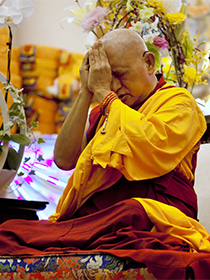- Home
- FPMT Homepage
Foundation for the Preservation of the Mahayana Tradition
The FPMT is an organization devoted to preserving and spreading Mahayana Buddhism worldwide by creating opportunities to listen, reflect, meditate, practice and actualize the unmistaken teachings of the Buddha and based on that experience spreading the Dharma to sentient beings. We provide integrated education through which people’s minds and hearts can be transformed into their highest potential for the benefit of others, inspired by an attitude of universal responsibility and service. We are committed to creating harmonious environments and helping all beings develop their full potential of infinite wisdom and compassion. Our organization is based on the Buddhist tradition of Lama Tsongkhapa of Tibet as taught to us by our founders Lama Thubten Yeshe and Lama Thubten Zopa Rinpoche.
- Willkommen
Die Stiftung zur Erhaltung der Mahayana Tradition (FPMT) ist eine Organisation, die sich weltweit für die Erhaltung und Verbreitung des Mahayana-Buddhismus einsetzt, indem sie Möglichkeiten schafft, den makellosen Lehren des Buddha zuzuhören, über sie zur reflektieren und zu meditieren und auf der Grundlage dieser Erfahrung das Dharma unter den Lebewesen zu verbreiten.
Wir bieten integrierte Schulungswege an, durch denen der Geist und das Herz der Menschen in ihr höchstes Potential verwandelt werden zum Wohl der anderen – inspiriert durch eine Haltung der universellen Verantwortung und dem Wunsch zu dienen. Wir haben uns verpflichtet, harmonische Umgebungen zu schaffen und allen Wesen zu helfen, ihr volles Potenzial unendlicher Weisheit und grenzenlosen Mitgefühls zu verwirklichen.
Unsere Organisation basiert auf der buddhistischen Tradition von Lama Tsongkhapa von Tibet, so wie sie uns von unseren Gründern Lama Thubten Yeshe und Lama Thubten Zopa Rinpoche gelehrt wird.
- Bienvenidos
La Fundación para la preservación de la tradición Mahayana (FPMT) es una organización que se dedica a preservar y difundir el budismo Mahayana en todo el mundo, creando oportunidades para escuchar, reflexionar, meditar, practicar y actualizar las enseñanzas inconfundibles de Buda y en base a esa experiencia difundir el Dharma a los seres.
Proporcionamos una educación integrada a través de la cual las mentes y los corazones de las personas se pueden transformar en su mayor potencial para el beneficio de los demás, inspirados por una actitud de responsabilidad y servicio universales. Estamos comprometidos a crear ambientes armoniosos y ayudar a todos los seres a desarrollar todo su potencial de infinita sabiduría y compasión.
Nuestra organización se basa en la tradición budista de Lama Tsongkhapa del Tíbet como nos lo enseñaron nuestros fundadores Lama Thubten Yeshe y Lama Zopa Rinpoche.
A continuación puede ver una lista de los centros y sus páginas web en su lengua preferida.
- Bienvenue
L’organisation de la FPMT a pour vocation la préservation et la diffusion du bouddhisme du mahayana dans le monde entier. Elle offre l’opportunité d’écouter, de réfléchir, de méditer, de pratiquer et de réaliser les enseignements excellents du Bouddha, pour ensuite transmettre le Dharma à tous les êtres. Nous proposons une formation intégrée grâce à laquelle le cœur et l’esprit de chacun peuvent accomplir leur potentiel le plus élevé pour le bien d’autrui, inspirés par le sens du service et une responsabilité universelle. Nous nous engageons à créer un environnement harmonieux et à aider tous les êtres à épanouir leur potentiel illimité de compassion et de sagesse. Notre organisation s’appuie sur la tradition guéloukpa de Lama Tsongkhapa du Tibet, telle qu’elle a été enseignée par nos fondateurs Lama Thoubtèn Yéshé et Lama Zopa Rinpoché.
Visitez le site de notre Editions Mahayana pour les traductions, conseils et nouvelles du Bureau international en français.
Voici une liste de centres et de leurs sites dans votre langue préférée
- Benvenuto
L’FPMT è un organizzazione il cui scopo è preservare e diffondere il Buddhismo Mahayana nel mondo, creando occasioni di ascolto, riflessione, meditazione e pratica dei perfetti insegnamenti del Buddha, al fine di attualizzare e diffondere il Dharma fra tutti gli esseri senzienti.
Offriamo un’educazione integrata, che può trasformare la mente e i cuori delle persone nel loro massimo potenziale, per il beneficio di tutti gli esseri, ispirati da un’attitudine di responsabilità universale e di servizio.
Il nostro obiettivo è quello di creare contesti armoniosi e aiutare tutti gli esseri a sviluppare in modo completo le proprie potenzialità di infinita saggezza e compassione.
La nostra organizzazione si basa sulla tradizione buddhista di Lama Tsongkhapa del Tibet, così come ci è stata insegnata dai nostri fondatori Lama Thubten Yeshe e Lama Zopa Rinpoche.
Di seguito potete trovare un elenco dei centri e dei loro siti nella lingua da voi prescelta.
- 欢迎 / 歡迎
简体中文
“护持大乘法脉基金会”( 英文简称:FPMT。全名:Foundation for the Preservation of the Mahayana Tradition) 是一个致力于护持和弘扬大乘佛法的国际佛教组织。我们提供听闻,思维,禅修,修行和实证佛陀无误教法的机会,以便让一切众生都能够享受佛法的指引和滋润。
我们全力创造和谐融洽的环境, 为人们提供解行并重的完整佛法教育,以便启发内在的环宇悲心及责任心,并开发内心所蕴藏的巨大潜能 — 无限的智慧与悲心 — 以便利益和服务一切有情。
FPMT的创办人是图腾耶喜喇嘛和喇嘛梭巴仁波切。我们所修习的是由两位上师所教导的,西藏喀巴大师的佛法传承。
繁體中文
護持大乘法脈基金會”( 英文簡稱:FPMT。全名:Found
ation for the Preservation of the Mahayana Tradition ) 是一個致力於護持和弘揚大乘佛法的國際佛教組織。我們提供聽聞, 思維,禪修,修行和實證佛陀無誤教法的機會,以便讓一切眾生都能 夠享受佛法的指引和滋潤。 我們全力創造和諧融洽的環境,
為人們提供解行並重的完整佛法教育,以便啟發內在的環宇悲心及責 任心,並開發內心所蘊藏的巨大潛能 — 無限的智慧與悲心 – – 以便利益和服務一切有情。 FPMT的創辦人是圖騰耶喜喇嘛和喇嘛梭巴仁波切。
我們所修習的是由兩位上師所教導的,西藏喀巴大師的佛法傳承。 察看道场信息:
- FPMT Homepage
- News/Media
-
- Study & Practice
-
-
- About FPMT Education Services
- Latest News
- Programs
- New to Buddhism?
- Buddhist Mind Science: Activating Your Potential
- Heart Advice for Death and Dying
- Discovering Buddhism
- Living in the Path
- Exploring Buddhism
- FPMT Basic Program
- FPMT Masters Program
- FPMT In-Depth Meditation Training
- Maitripa College
- Lotsawa Rinchen Zangpo Translator Program
- Universal Education for Compassion & Wisdom
- Online Learning Center
-
- Prayers & Practice Materials
- Overview of Prayers & Practices
- Full Catalogue of Prayers & Practice Materials
- Explore Popular Topics
- Benefiting Animals
- Chenrezig Resources
- Death & Dying Resources
- Lama Chopa (Guru Puja)
- Lama Zopa Rinpoche: Compendium of Precious Instructions
- Lama Zopa Rinpoche: Life Practice Advice
- Lama Zopa Rinpoche Practice Series
- Lamrim Resources
- Mantras
- Prayer Book Updates
- Purification Practices
- Sutras
- Thought Transformation (Lojong)
- Audio Materials
- Dharma Dates - Tibetan Calendar
- Translation Services
- Publishing Services
- Ways to Offer Support
- Prayers & Practice Materials
-
- Teachings and Advice
- Find Teachings and Advice
- Lama Zopa Rinpoche Advice Page
- Lama Zopa Rinpoche: Compendium of Precious Instructions
- Lama Zopa Rinpoche Video Teachings
- ༧སྐྱབས་རྗེ་བཟོད་པ་རིན་པོ་ཆེ་མཆོག་ནས་སྩལ་བའི་བཀའ་སློབ་བརྙན་འཕྲིན།
- Podcasts
- Lama Yeshe Wisdom Archive
- Buddhism FAQ
- Dharma for Young People
- Resources on Holy Objects
- Teachings and Advice
-
-
*If a menu item has a submenu clicking once will expand the menu clicking twice will open the page.
-
-
- Centers
-
- Teachers
-
- Projects
-
-
-
-
*If a menu item has a submenu clicking once will expand the menu clicking twice will open the page.
-
-
- FPMT
-
- Shop
-
-
-
The Foundation Store is FPMT’s online shop and features a vast selection of Buddhist study and practice materials written or recommended by our lineage gurus. These items include homestudy programs, prayers and practices in PDF or eBook format, materials for children, and other resources to support practitioners.
Items displayed in the shop are made available for Dharma practice and educational purposes, and never for the purpose of profiting from their sale. Please read FPMT Foundation Store Policy Regarding Dharma Items for more information.
-
-
7
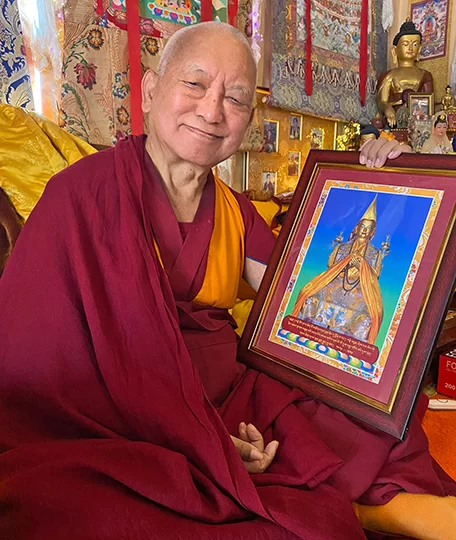
Lama Zopa Rinpoche with a picture of Lama
Tsongkhapa that Rinpoche liked very much,
Kopan Monastery, Nepal, February 2022.
Photo by Ven. Roger Kunsang.
The Lama Tsongkhapa Teachers Fund (LTKTF) continues to be a cornerstone in preserving the Geluk lineage of Tibetan Mahayana Buddhism. Named after the 14th-century master Lama Tsongkhapa (1357–1419), the Fund embodies His vision of integrating deep scholarship, ethical discipline, and meditative insight. In 2025, the Fund has already disbursed US$174,568, reinforcing its commitment to sustaining the living transmission of Dharma teachings.
Lineage Teachers | Annual Geluk Exam | Annual Winter Debate | Scholastic Achievement | Geluk Lineage | Medical Research | Thank you!
Supporting Our Lineage Teachers
Since its inception in 1997, the Fund has provided monthly stipends to 141 senior Geluk teachers, including past and present abbots of the main geluk monasteries, umzes, and teachers from major monasteries such as Sera Je, Sera Mey, Gaden Jangtse, Gaden Shartse, Drepung Loseling, Drepung Gomang, Gyudmed, Gyuto, Rato, and Tashi Lhunpo. These stipends – totaling around US$14,080 annually – ensure that these scholars can focus fully on their spiritual and academic pursuits.
On August 31, 2025, the annual graduation ceremony of Great Examination of Gelugpa University was successfully completed with the graduation of second-year Lhopon, and a closing ceremony was held. During the ceremony, certificates and tokens of appreciation were also presented to the participants.
Supporting the Annual Geluk Exam
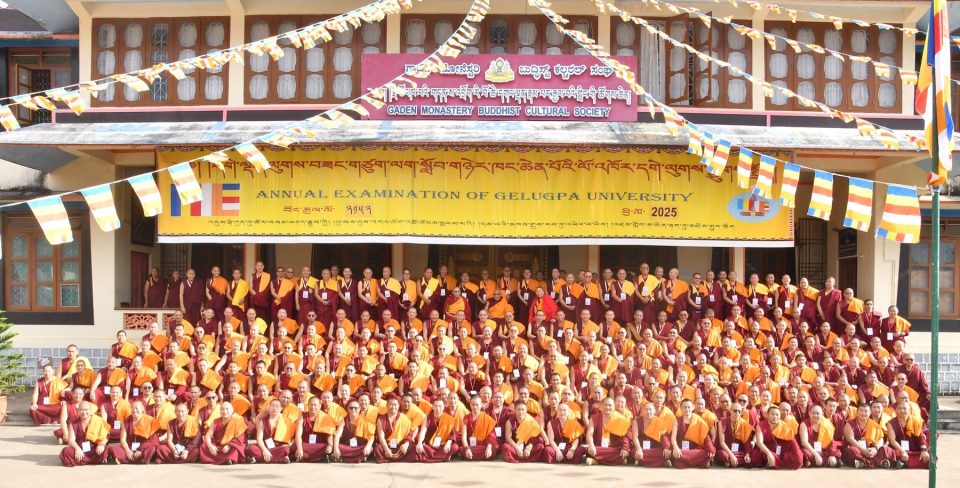
Supporting the Annual Geluk Exam.
During the event, Geshe Sonam Norbu, Director of the Gelugpa Cultural society, spoke about how the great patron of the teachings, the late Lama Zopa Rinpoche, who from 1997 until now, through the Lama Tsong Khapa Teachers Fund, has provided food, provisions, and travel expenses to retired abbots from the three great monastic seats, great teachers, and participants in the Gelug debate examinations. The director dedicated the merit of such extensive service to the teachings and expressed prayers and encouragement that Rinpoche’s unmistaken reincarnation would quickly arrive and be able to continue his predecessor’s legacy of spiritual accomplishments.
In 2025, US$10,841 was allocated to support the Geluk Exam, a rigorous test of philosophical understanding.
Supporting the Annual Winter Debate
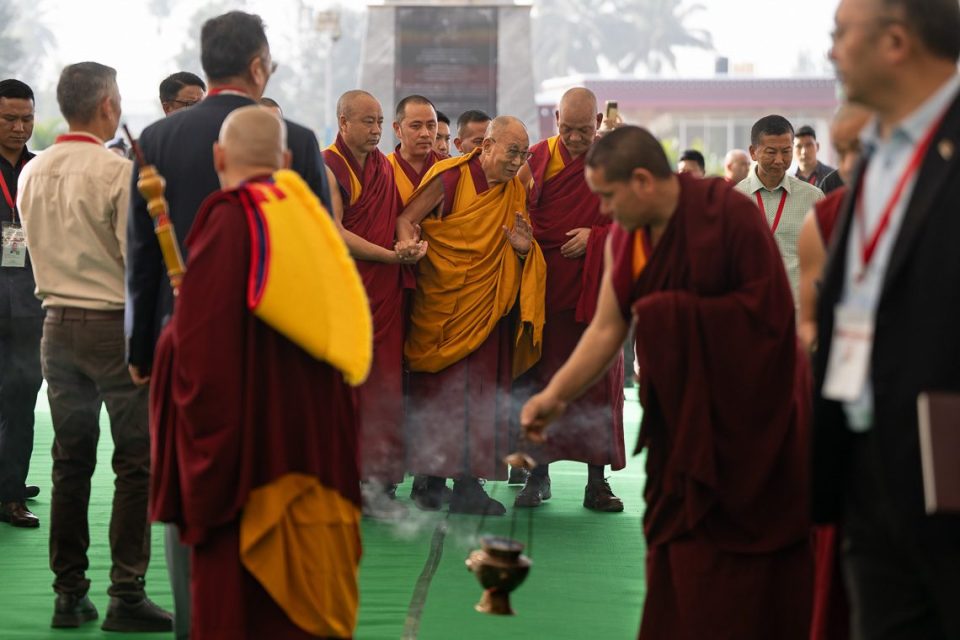
His Holiness the Dalai Lama arriving at debate ground of Tashi Lhunpo Monastery to attend the Winter Debating Session in Bylakuppe, Karnataka. Photo by Tenzin Choejor. January 2025
The Fund also sponsors the annual Winter Debate, which bring together hundreds of monks from the eight major Geluk monasteries.
The Winter Debate, hosted this year at Gaden Monastery, received US$16,609 in funding. This covered round-trip bus travel and offerings of milk and fruit, and organizational costs for nearly 500 monks.
Honoring Scholastic Achievement
Since 2000, a cherished tradition has been upheld through the offering of complete sets of robes to monks who successfully memorized the Migsel Loguk Chenpo text. For 25 years, this offering has honored their dedication and inspired continued excellence in Dharma study. In 2025, 119 students were recognized with robes and ceremonial scarves, representing a total offering of US$3,038.
Strengthening the Geluk Lineage
The LTKTF and its partner, the Geluk International Foundation (GIF), have made remarkable strides in 2024–2025 in preserving and advancing the Geluk tradition of Tibetan Buddhism. Through sponsorship and coordinated efforts, this initiative has empowered scholars, teachers, and monastic institutions across India to deepen their study and transmission of the Dharma.
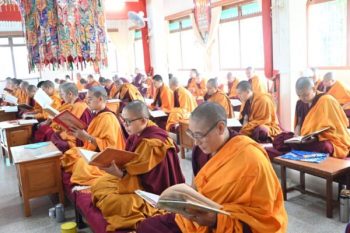
Jangchup Choeling Nunnery nuns are celebrating Lama Tsongkhapa’s Day on December 25th, 2024.
Source: Jangchup Choeling Nunnery’s website.
The Research and Training of Specialist Geshes and Geshemas project, initiated in 2020 under the guidance of His Holiness the Dalai Lama, has grown to include dozens of scholars from over 10 major monasteries, including: Sera Jey & Sera Mey, Gaden Jangtse & Gaden Shartse, Drepung Gomang & Drepung Loseling, Gyuto & Gyumed Tantric Monasteries, Tashi Lhunpo Monastery, Rato Monastery, and Jangchup Choeling Nunnery.
Each scholar is engaged in a three-year research program focused on one of the five major treatises of Buddhist philosophy: Pramana (Logic), Prajnaparamita (Perfection of Wisdom), Madhyamaka (Middle Way), Abhidharma (Phenomenology), and Vinaya (Monastic Discipline). Their work includes quarterly submissions of research papers, guided by appointed instructors and supervisors, and culminates in a thesis reviewed by an expert committee.
The Geluk International Foundation has implemented a robust monitoring system, including:
- Regular workshops on research methodology
- Quarterly progress tracking and feedback
- Personalized mentorship for each scholar
- Coordination with abbots and monastic leaders to ensure timely submissions and project alignment
This year, the annual grant for the Research and Training Project for Specialist Geshes and Geshemas reached US$77,500, while the Third Research and Training Project received US$37,500.
These funds, were used to provide stipends to scholars, instructors, and supervisors across all participating monasteries. Together, these initiatives cultivate the next generation of Buddhist scholars, ensuring the Geluk tradition remains intellectually robust and accessible to future generations.
Funding Tibetan Medical Research
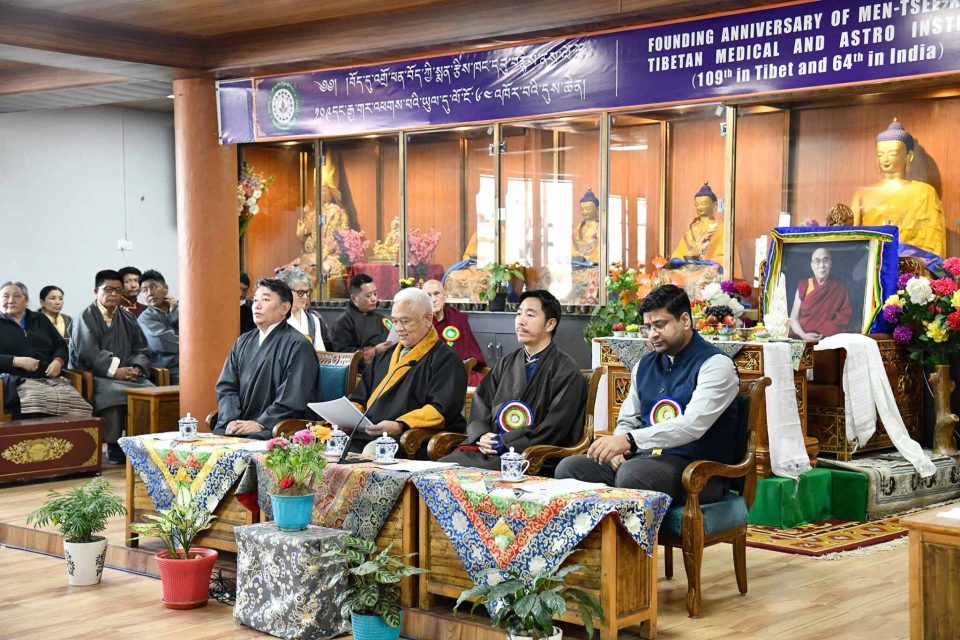
On March 25, 2025, Men-Tsee-Khang celebrated its 109th founding anniversary since its establishment in Lhasa, Tibet, in 1916 by His Holiness the 13th Dalai Lama, and its 64th year since its re-establishment in Dharamsala, India, in 1961 by His Holiness the 14th Dalai Lama. Source: Men-Tsee-Khang’s official website.
In 2025, a grant of US$15,000 was offered to Men-Tsee-Khang. Men-Tsee-Khang’s Clinical Research Department has launched a retrospective observational study to evaluate the role of Traditional Tibetan Medicine (TTM) in cancer care. Led by Dr. Dorjee Rabten Neshar and a team of Tibetan medical researchers, the study explores how ancient Sowa Rigpa principles can complement modern oncology.
TTM views cancer as an imbalance among the body’s three energies: rlung (wind), mkhris-pa (bile), and bad-kan (phlegm), and treats it holistically through herbal formulations, dietary changes, external therapies, and mental well-being practices.
The two-year study will analyze patient records from Men-Tsee-Khang clinics to assess survival rates, quality of life, symptom changes, and safety outcomes among cancer patients who received TTM for over three months. Results will be compared to existing cancer survival data to evaluate TTM’s potential as a complementary, safe, and affordable treatment option.
This initiative marks a significant step toward integrating Tibetan healing wisdom with global cancer research—bridging tradition and modern science for compassionate, holistic care and this research continues to advance knowledge and share valuable findings at Tibetan medical conferences in Dharamsala.
Full funding for the Research and Training projects, as well as the Tibetan Medical Research, has already been received and is being administered by the Lama Tsongkhapa Teachers Fund.
Thank You!
Your continued support is not only sustaining the Geluk lineage but actively nurturing its future. With your help, these scholars are building bridges between tradition and contemporary understanding, ensuring that Lama Tsongkhapa’s legacy continues to illuminate minds across generations!
The Lama Tsongkhapa Teachers Fund preserves the unbroken Tsongkhapa lineage, and cultivates the foremost scholars of tomorrow. The fund provides support to the abbots and senior teachers of the Lama Tsongkhapa tradition, supports the annual Gelugpa exam and monks and nuns to attend the annual winter debate among many other activities.
- Home
- News/Media
- Study & Practice
- About FPMT Education Services
- Latest News
- Programs
- New to Buddhism?
- Buddhist Mind Science: Activating Your Potential
- Heart Advice for Death and Dying
- Discovering Buddhism
- Living in the Path
- Exploring Buddhism
- FPMT Basic Program
- FPMT Masters Program
- FPMT In-Depth Meditation Training
- Maitripa College
- Lotsawa Rinchen Zangpo Translator Program
- Universal Education for Compassion & Wisdom
- Online Learning Center
- Prayers & Practice Materials
- Overview of Prayers & Practices
- Full Catalogue of Prayers & Practice Materials
- Explore Popular Topics
- Benefiting Animals
- Chenrezig Resources
- Death & Dying Resources
- Lama Chopa (Guru Puja)
- Lama Zopa Rinpoche: Compendium of Precious Instructions
- Lama Zopa Rinpoche: Life Practice Advice
- Lama Zopa Rinpoche Practice Series
- Lamrim Resources
- Mantras
- Prayer Book Updates
- Purification Practices
- Sutras
- Thought Transformation (Lojong)
- Audio Materials
- Dharma Dates – Tibetan Calendar
- Translation Services
- Publishing Services
- Teachings and Advice
- Find Teachings and Advice
- Lama Zopa Rinpoche Advice Page
- Lama Zopa Rinpoche: Compendium of Precious Instructions
- Lama Zopa Rinpoche Video Teachings
- ༧སྐྱབས་རྗེ་བཟོད་པ་རིན་པོ་ཆེ་མཆོག་ནས་སྩལ་བའི་བཀའ་སློབ་བརྙན་འཕྲིན།
- Podcasts
- Lama Yeshe Wisdom Archive
- Buddhism FAQ
- Dharma for Young People
- Resources on Holy Objects
- Ways to Offer Support
- Centers
- Affiliates Area
- Teachers
- Projects
- Charitable Projects
- Make a Donation
- Applying for Grants
- News about Projects
- Other Projects within FPMT
- Support International Office
- Projects Photo Galleries
- Give Where Most Needed
- FPMT
- Shop
Translate*
*powered by Google TranslateTranslation of pages on fpmt.org is performed by Google Translate, a third party service which FPMT has no control over. The service provides automated computer translations that are only an approximation of the websites' original content. The translations should not be considered exact and only used as a rough guide.Like molding dough in your hand, you can definitely turn your mind whichever way you want.







